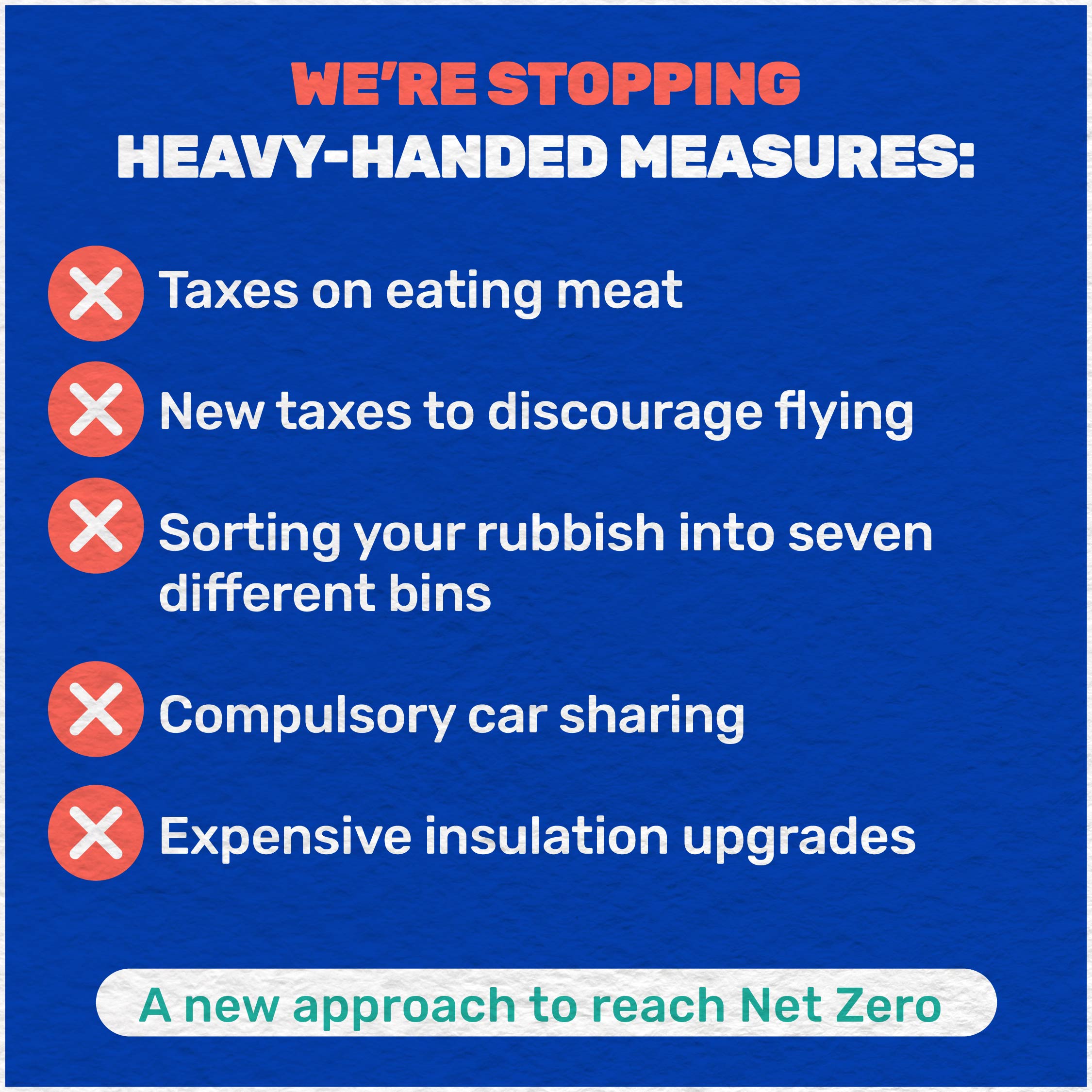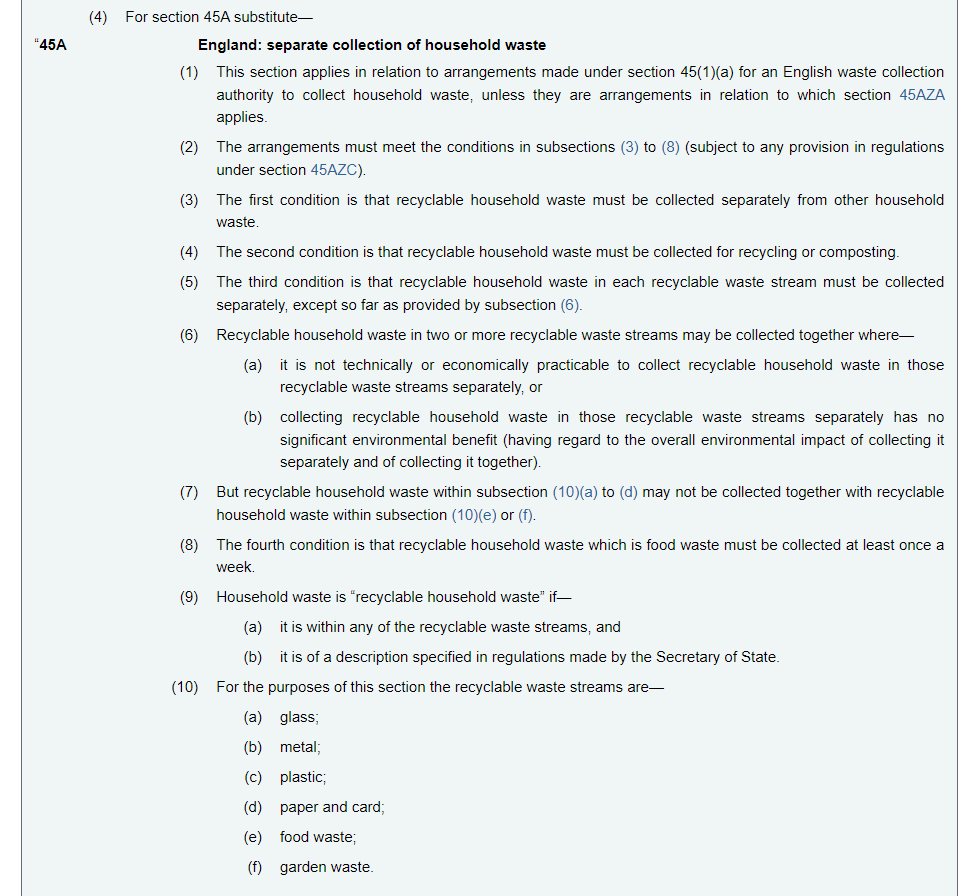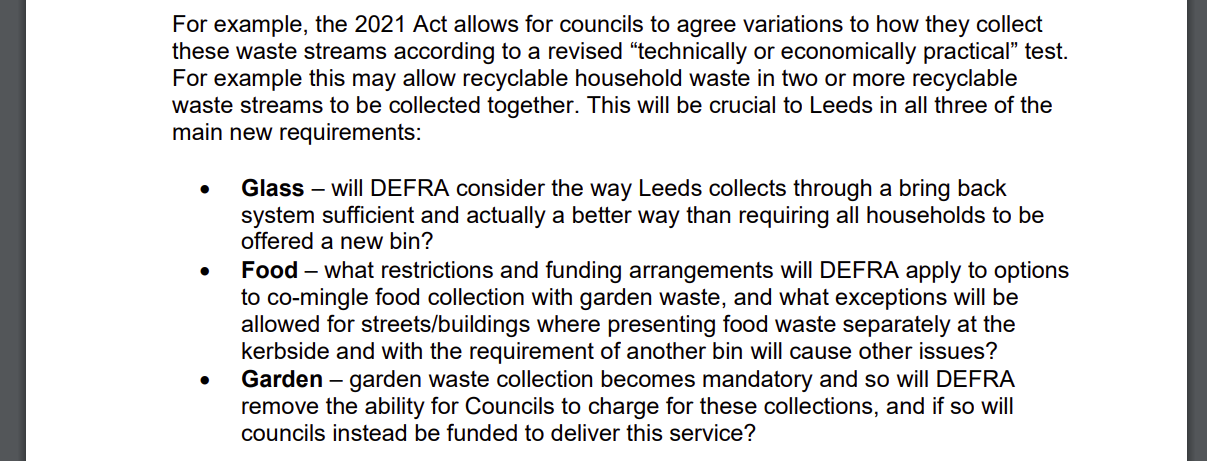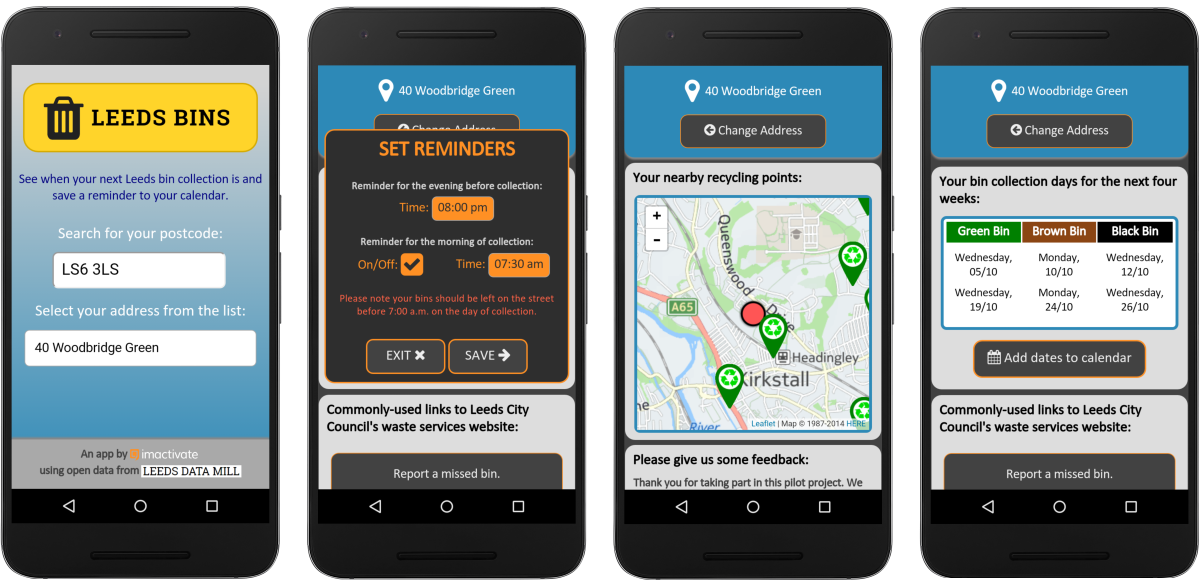
Seven Deadly Bins.
, .
Today the UK Prime Minister announced a number of changes he intends to make to UK law. He claims that they will keep us on track to meet our Net Zero By 2050 commitment. Many are sceptical.
On one of the hastily put together slides for X (the social network formerly known as Twitter) he promised to “stop heavy-handed measures [to require] sorting your rubbish into seven different bins”.

X went wild. Clearly, such a ridiculous proposal must be nonsense. A dishonest and disgraceful fabrication by the UK’s Prime Minister! Of course seven bins aren’t required, I only have three!
Waste streams
The Seven Bins requirement refers to the part of the Environment Act 2021 that places new requirements on local government in England (waste collection is devolved so Wales, Scotland, and Northern Ireland are different. Wales especially does interesting stuff on recycling that you should check out).
Specifically, Part 3 (Managing waste) Section 57 (Separation of waste) of the Environment Act 2021 amends Section 45A of the Environmental Protection Act 1990 to add extra requirements on how local authorities collect recycling.
At this point I’ll be clear that I am not a lawyer. I am going to get a lot of lawyer language wrong in this blog post. If that’s a dealbreaker for you just say “this idiot’s not even a lawyer” and save your time.

From this law we get the number seven. Section 45A(10) lists the six recyclable waste streams that must be collected. These are in addition to other household waste which must be collected separately by point 3. Point 5 insists that all seven waste streams are collected separately.
Seven separate bins. Seven separate collections.
But then it uses the word except.
The word except is expanded upon in point 6. If a local authority can show, argue, or prove (the level of proof required and who has to judge that proof and approve or deny the request is not defined here) that multiple recyclable waste streams being collected separately is no better for the environment, is too technically difficult, or is prohibitively expensive, they don’t have to do it. Point 7 limits this right of combined collection to certain waste groups that many people in the industry think are unhelpful but that’s a discussion for another time.
So the law is pretty simple. There are seven waste streams. You need to collect them separately. So you need seven bins. Except if you don’t.
I’ve only got three!
A common reaction on X has been to insist that this isn’t the law because “I’ve only got three bins”. And I too only have three bins. So what’s going on!
Helpfully Angelo Basu, the very pleasant Chair of Leeds North West Conservatives and, more importantly, a lawyer specialising in EU law and regulatory compliance, has helped me out.
Section 147 point 3c of the Act says that section 57 which amends section 45a of The Environment Act 1990 only comes into force when the Secretary of State says so. I think that the mechanism that they’re going to use to “say so” is to pass what is now called the Simpler Recycling Bill, but more on that later.
Local authorities are working hard and working closely with each other, their suppliers, and with national government to be ready for when the Secretary of State applies the law. But for now you’ve probably got the same bins as you did before the Environment Act 2021 received Royal Assent.
But the exceptions!
Where I live in Leeds (different areas of Leeds get different services), the council collects three streams of recyclable waste — paper/cardboard, metal cans, plastic — in one green bin. They also collect household waste in a black bin. And garden waste in a brown bin (which I paid for, but which I do not pay to have collected). Neither food waste nor glass are collected kerbside.
This is all in keeping with The Environmental Protection Act 1990. But that will soon be amended and Leeds City Council has been getting ready for the eventual activation of section 57 of the Environment Act for at least a year.
Because the UK is a very good democracy, and Leeds City Council is an excellent democracy, you can find online and read many reports such as this Waste Strategy Update and Local Refuse Performance Report to The Leeds Inner South Community Committee by the Chief Officer, Environmental Services, Leeds City Council. There are probably minutes of the meeting, you can probably watch online, if you live in Leeds Inner South your councillor probably went, and if you really want to go all in on local democracy you can probably ask to attend in person next time.
These are the kind of questions that Leeds City Council is asking the UK government (DEFRA - Department for Environment, Food and Rural Affairs) about how it should interpret the Environment Act.
1/ Do we really have to collect glass from the kerbside? We’ve got bottle banks.
2/ Can you please tell us more about the conditions you’re going to apply when you decide whether we can mix food and garden waste. Also is “small terraced streets already have too many bins” a good enough argument to not have more bins?
3/ If you’re making garden waste collection mandatory are you also going to require it to be free? And if you are, how are you going to compensate the councils that currently charge for these collections? We don’t currently charge, but we shouldn’t miss out on that compensation because of that.
Or you can read the questions and interpret them yourself.

My point here is that there are possible exceptions to the rules that mean some places, perhaps many places, wouldn’t have ever had to have seven bins.
That is being discussed and negotiated. Local governments are chronically short of money, and almost completely restrained from raising any more. The new rules impose quite heavy costs on them and these will have to be met in large part by either central government funding or the right to raise more money locally (fancy an extra 1% on your council tax for bins?). I suspect this has focused Rishi Sunak’s mind much more than any net zero related feature of the plans.
Those discussions will continue. But they will do so in light of the Prime Minister’s comments today and the rapid response from The Environment Secretary Thérèse Coffey’s department. Which brings us back to Simpler Recycling.
So how will Sunak change this?
Thanks to Paul Waugh at The I Paper we know quite a bit more about how the Prime Minister is going to avoid the nightmare Seven Bin Scenario that his law probably made quite likely (subject to negotiated exceptions).
The Department has said,
“As set out in the Prime Minister’s speech today, the Environment Secretary is leading a new pragmatic approach to boost recycling rates and put the long-term interests of our country first.
She will introduce Simpler Recycling (formerly known as Consistency in Recycling), a plan which scraps the top-down approach, ensures a requirement to recycle with seven bins will not happen and brings forward a smarter approach that responds to feedback and forges a new path on reuse and recycling.
The new Simpler Recycling system, to be outlined shortly, will ensure all homes in England recycle the same materials, ending the confusion and postcode lottery over what can and can’t be recycled.”
So this is how the Prime Minister is going to get out of Seven Bin Hell. Put some guidance or some amendments in the Simpler Recycling Bill that say “yeah, of course, we always meant that you could put bean cans, beer bottles, Amazon packaging, and your Prime Hydration bottle in the same bin, and if you didn’t understand that at the time then you’re probably thick”. Probably they’ll use lawyerish language to say that.
This is a good thing. Local government have been asking the UK government to do this for about four years. Almost none of that motivation was to do with net zero. Almost all of the motivation was about maintaining the efficiency, responsiveness, and local accountability of local waste collection. It is good that the UK government has finally listened.
Though sadly it is clear that they have not listened that much. While they claim that they are "scrapping the top-down approach" they rapidly follow up with a promise to introduce a new top-down requirement that all local government recycle the same materials to end a postcode lottery.
This will impose significant costs. Recycling some materials is cost effective in some places, usually large cities, but not in others where driving long distances to collect small amounts of waste and bring it to distant specialist recycling machinery is neither cost effective nor good for the environment. “Ending a postcode lottery” is just another way of saying “centrally-imposing an inefficient and unaccountable one-size-fits-all solution”.
Why do you care so much about bins?
At this point you’re hopefully wondering — why do you care about bins so much, Tom? And you’re probably thinking that actually you care about bins a lot too, so it’s normal. But let me share my bins pedigree.
I have for the past eight years run the Leeds Bins app. It has been installed on 107 thousand phones in Leeds. It has 30 thousand unique users per month, a good proportion of the 350 thousand households in the city. It has been used 5 million times and delivered over 40 million bin collection times.

We also run apps in Rotherham, Luton, and Fenland with similar success. We don't make any profit from this work, but that's fine, I also help run The Data City where we do.
We would like to run more such apps and have even released the source code of the software that powers the apps in case others want to run them. But three decisions by UK governments hold us back enormously.
- The UK government’s decision to privatise the UK’s address system. You can learn more about that from James O’Malley or in this special blog post I did on the problem as it relates to bin apps. In summary, local governments cannot legally release their bin collection timetables as useful open data and that makes developing apps like this much more expensive.
- The UK government’s 2018 Accessibility Requirements. These are very well-intentioned and my apps and my websites are designed with accessibility in mind. I’m not perfect, but I am pretty good. What I am not good at is getting certification for such things. Increasingly, local government, especially where it is reliant on central government funding for small digital projects, has started asking for that certification but without anywhere near the budget needed to pay for it.
- The adoption by local governments in the UK of the Local Digital Declaration which brings into local government many of the ways of developing digital government services that work well for the UK government’s GDS working on projects with a £200k to £10m budget but which don’t work so well on an app like this with a budget of around £2000.
Tom, you’re inventing the seven bins thing, no-one else thinks this.
You’re still reading? Wow.
Quite a few people disagree with me. They say that Rishi Sunak invented the Seven Bins thing and that it was never going to happen.
Here’s a Press Release from all the way back in June 2021 where the combined voice of 168 of England’s District Councils says “Households may need up to SEVEN bins as part of the biggest shake up of rubbish collections in years which will create chaos and confusion”.
Those fears hadn’t reduced by March 2023 with the BBC reporting widespread among local councils that “the changes could see councils ordered to arrange the separate collection of six types of recyclable” waste. That’s seven separate collections once you include non-recyclable waste.
So if Rishi Sunak was making up this issue, a lot of other people in the sector got there first.
I know that I’m not imagining the fears around this. I’ve filled in both consultations about these proposals. I’ve spoken with many local councils on the issue and I’m working with them now to ensure that they can meet whatever requirements they have to. I continue to work with one of the UK’s largest waste services companies who made strong representations against the changes that are soon to be applied by the UK government even though they would likely benefit monetarily from them. Local democracy matters.
Whether it’s seven bins, six bins, or just more bins than now, the mess that Rishi Sunak today promised to avoid was real. The problem for him is that the mess was created so recently that he was a Minister at the time it was created and he voted for it all.
His solution doesn’t even seem to solve the biggest problem, that the UK central government is micromanaging one of the most inherently local functions of government. Far from releasing people and communities from the grip of the government, he is tightening that grip. And I think that motivated his announcement today on bins more than any concerns about Net Zero.